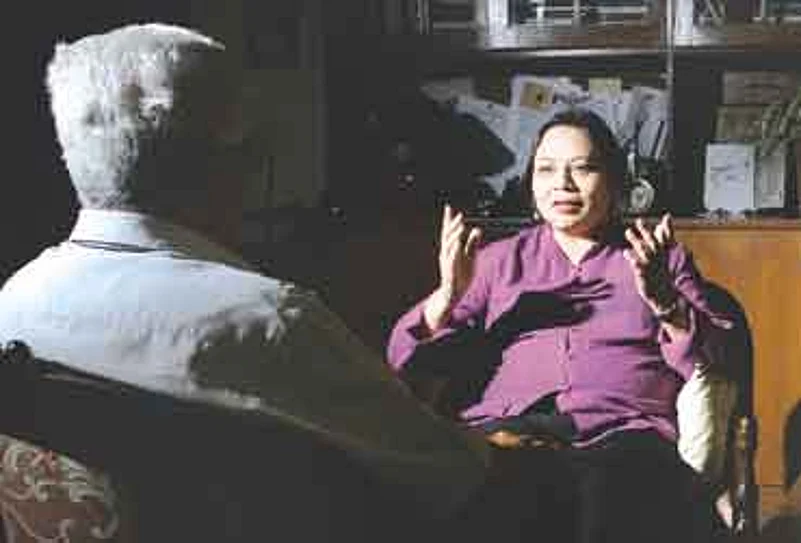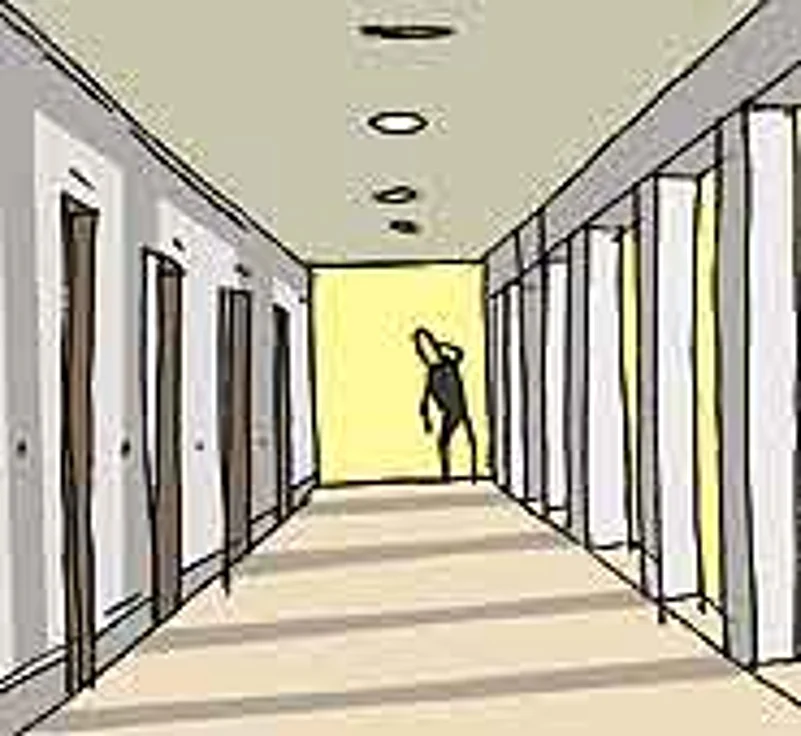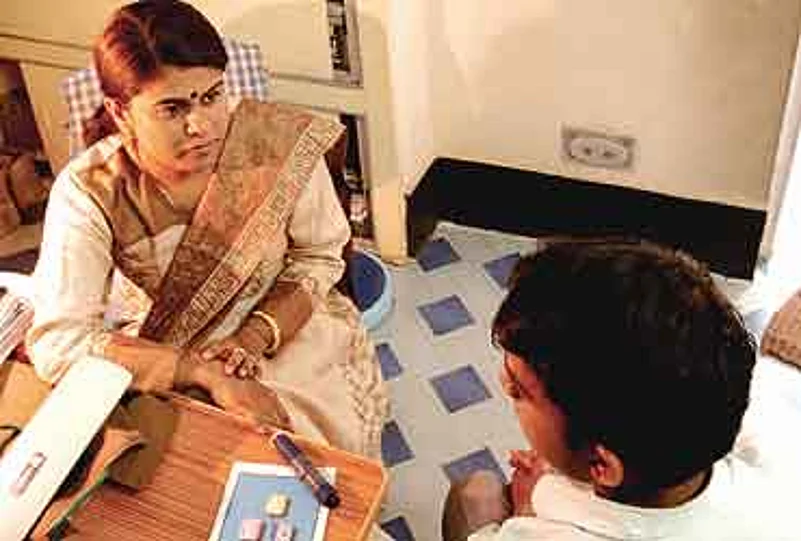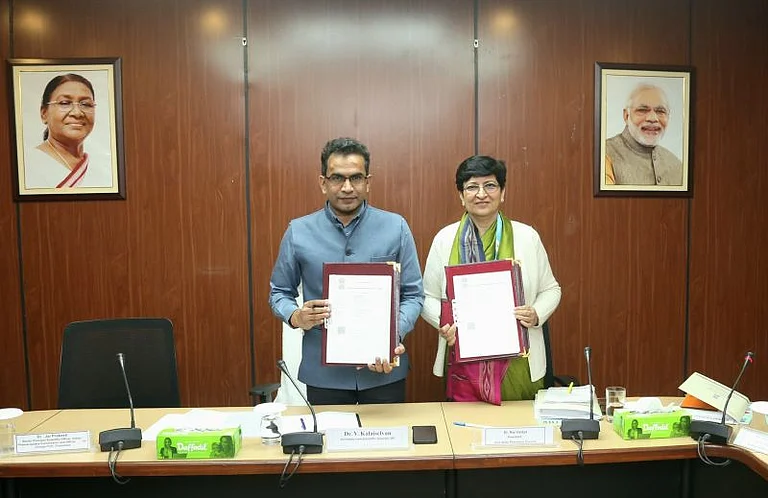
"Earlier it was mostly referrals, now there are walk-ins. People don't wait for breakdowns Before they come in." Reena Nath, Family Therapist
Delhi-based family therapist Reena Nath's appointment diaries registered 10 clients a week in 2002, compared to 22 entries in January 2005. The Child and Adolescent Mental Health Programme (CAMHP) in the capital's Sitaram Bhartia hospital, which began nine months ago with 20 cases, has over 200 now. Her clinical experience corroborates a tenfold increase in cases over the last decade, says Bharati Visweswaran, consulting psychologist at Chennai's Apollo hospital. Thara Srinivasan, who heads the Schizophrenia Research Foundation in Chennai, notes a qualitative change too: "Unlike before, people aren't just coming to us with medical and psychiatric problems, but also with emotional and stress-related issues." Calcutta psychiatrist S.K. Hazra recalls there were no more than 20 of his ilk in all of West Bengal in the late '90s, and marvels that the state has more than 250 now: "Significantly, clients earlier came to me as referrals from other medical practitioners, but in the last five years large numbers are visiting me directly."

Non-metros too mimic this change. Of Pune's 10 top schools, seven have psychologists. In the same city, psychiatrist Nilesh Naphade takes 15 clients daily because he "can't take any more appointments"; and over the four Sundays of the month that he divides between working in Daund and Ahmednagar, he sees over 300 people! Bhopal has over a dozen practising psychologists, and 10 psychiatrists. "A far cry from there being just two of us here 20 years ago," recounts psychiatrist S. K. Tandon, "The number of clients we collectively counsel per day now has shot from 100 to about 500." Clinical psychologist Dwarka Prasad says, "The inability to cope with expectations, your own and others', is becoming an epidemic." One that has him working overtime with practices at Chandigarh, Hoshiarpur and Jalandhar.

"The inability to cope with expectations is becoming like an epidemic, bringing in growing numbers to us."
Dwarka Prasad, Clinical Psychologist
Not that these specialists, albeit fewer, weren't there earlier, just that they'd existed on the peripheries of our mind: they were for the severely dysfunctional, for the insane. Or for the super-rich who could afford sessions in self-absorption. For the rest, visiting a shrink was taboo. If you needed to see a shrink, you were mad, or couldn't cope, weren't resilient, thus weak. Anyway, with your family, friends, guru, the astrologer even, there for succour, why need you go to a shrink? And if you still had to, keep it hush hush.
How things have changed. At a recent party, a guest asked Mumbai psychiatrist Shamsah Sonawalla if he might have bipolar disorder because he had a family history of the illness, and was experiencing mood swings: "His acute awareness of his emotional health pleasantly surprised me." No wonder, for, as her colleague Rajesh Parikh says: "When I became a psychiatrist, I was told people would avoid me at parties, that my patients would be thankless because they wouldn't want to acknowledge they were seeking mental help." But now, about 15 per cent of Parikh and Sonawalla's clients come for their first visit armed with printouts of net searches they've done to research their problems. "Most of them have some sense of what they have and sometimes even of how it needs to be cured and what medication is needed," says Sonawalla. And far from hiding their troubles, more of Parikh's clients now take medical certificates from him when they need time off from work. Many say their colleagues and bosses are more cooperative and accommodating after knowing their mental problems.

What explains this change of attitude? "We've delayed, dawdled but finally got to the realisation that there is a middle mental space between the body and the soul. And this space might need repair even without one being physiologically problematic or spiritually impoverished," analyses sociologist Shiv Visvanathan, "And it cannot be medicated by the general physician or cured by the guru, it needs its own specialist."
The Bharatias of Calcutta are "converts to the idea of counselling". Three years ago, their five-year-old son Rishav started returning from school with his uniform soiled: "he wasn't even a bed-wetter at home". Weeks of soiling and deliberations later, the Bharatias took Rishav to a child psychologist. Who assessed that Rishav was not being able to cope with being promoted to the next class, and wrote in to his school asking he be allowed to continue in the junior class one more year. Rishav is doing fine today. "Who'd have known but an expert," say the Bharatias. "We recommend counselling to all parents. There's nothing shameful about it, it's like taking your child to a doctor when he's sick."
But Mumbai businessman Sean Patel is a less forceful advocate; he's had too much resistance against his going to the 'cuckoo-doctors'. His family dragged him to one godman after another; and finally to a doctor. And even though it was this doctor who referred Sean to the therapist he's been seeing for the past seven months, his family still doesn't approve."I tell people how therapy might help them as it has me, and leave it at that," says he. "Because most think they'll never need it, it's a 'not me' attitude."

Unsurprisingly then, it took Delhi-based executive Sanjeev Daulatram over a year of his wife Kanika's being in therapy to realise that he too needed counselling.Paradoxical that it was Sanjeev who'd insisted Kanika visit a shrink; she'd become a morose mess over seven years of married life.She was the 'patient' as far as he was concerned.Till, painful and poignant sessions over months unfolded Sanjeev's verbal aggression, emotional apathy, and alcohol dependency. Says the therapist who was seeing the Daulatrams till recently: "Part of the resolution was in getting the couple to realise she wasn't the only one in need for counselling, they both were".
But these breakthroughs apart, the fact that Sanjeev and his likes today are aware that they can talk through their problems with shrinks is itself significant furtherance in the cause of mental wellbeing. And many acknowledgments must be made here.

"Constant media exposure has highlighted the role of mental health professionals in non-clinical situations."
Samir Parikh, Psychiatrist
For one the media, accused however much of superficiality, and justifiably perhaps in this case, has made the mental health professional a household name today. Newspapers, radio, television—all of media has promoted every which type of shrink in all possible avatars. Prodding the shrink for bytes on tsunami trauma to quotes on licentious lingerie with equal alacrity. And, in the process, even creating some celebrity shrinks. One such is psychiatrist Samir Parikh of Delhi's Max Healthcare: "That we now agree to speak on almost anything to the media has highlighted the role of mental health professionals in non-clinical situations." That position of strength attained, Parikh contends, it's for shrinks to leverage it to educate people. He conducts at least three workshops a week, in schools, companies, people's organisations.
But this information dissemination would've meant little if body doctors hadn't upped their awareness on mental health. "For instance, a paediatrician today is far more sensitised to the emotional needs of a child, and referrals have shot up," says family therapist Shelja Sen at Delhi's Sitaram Bhartia hospital. Also, mind doctors themselves, Sen feels, have begun perceiving the problems presented to them in context rather than isolation: "With a child I don't just focus on the child's problems, but also try to understand the disturbances in relationships around the child."
The fact that a therapist's clinic today "doesn't have hospital environment" helps, says Chennai-based psychiatrist Vijay Nagaswami: "We've ensured that there are no crowded waiting rooms, that one feels secure about privacy and confidentiality. Most importantly, we've now made sure we come across as seeing clients, not patients."

"Some clients come without any manifest problems. It's just like a medical check-up every six months."
Ruma Bhattacharya, Psychiatrist
This differentiation has truly made a difference. Earlier mostly schizophrenics, now the bulk of psychologist Vandana Narula's clients in Chandigarh are "average middle-class people who come to me with something like conducting an IQ test for their child, for pre-marital counselling, or are stressed-out teenagers." Reveals Ruma Bhattacharya, psychiatrist in Bhopal: "A couple, back here in India after a stint in Europe, sees me every month just to smoothen their adjustment process. " Delhi-based psychoanalyst Ashok Nagpal says people come to see him "not with symptoms but with beginnings of narratives," and that the measure of the effectiveness of his session with them could be "one moment of acute insight".
Most callers who ring into his radio show, says Mumbai psychologist Harish Shetty, disclose names, ages and addresses.The talks he conducts in schools and colleges have students openly putting up hands when asked if they've ever felt suicidal or were sexually abused.At camps Shetty sometimes holds at busy local railway stations, harried commuters drop by and talk about intimate problems like lack of sexual performance, and depression due to work-related issues. Observes Shetty: "Feelings and emotions are becoming a part of public discourse."
Atrend that needs to be energised, advocates Delhi psychiatrist Amit Sen: "Because it's a secure society that can talk about its insecurities", only when people have been able to do away with the most primitive of their fears.Illustrates Sen: "A city couple distraught with familial opposition to their inter-community marriage can think of visiting the therapist to talk through their distress. In the heartlands, such a couple would perhaps be trying to survive being hacked." Ergo, concludes Sen, the upswing in the numbers visiting the shrink in our cities today need not be linked only to the rising conflict and chaos in urban Indian lives.It needs also to be read as our having acquired the space and confidence to look our vulnerabilities in the eye.

"Today parents, schools, paediatricians are all much more sensitised to the issue of children's mental health."
Amit Sen, Child Psychiatrist, Shelja Sen, Family Therapist
But cautionary voices against over-reliance on the shrink are already being heard. Indiscreet, infinite visits to the therapist, they warn, might lead us to the American situation. Where, as Jeffrey Moussaieff Masson's book Against Therapy reports, "...each American is supposed to consult a psychoanalyst daily..." and "psychotherapy, like credit cards and television, is big business".
"In the US, indiscriminately taking all your problems to your therapist is fashionable. We haven't got there yet, but will in a few years," predicts Calcutta psychiatrist C.S. Mukherji. "This will mean stopping, looking within for solutions, and reducing our innate ability to solve problems." Zana Deb, clinical psychologist in the same city, homes in further: "In many metros now, it's almost a status symbol to have a counsellor. People often come to me and say nothing's wrong with them, they just want to see me for some 'personal growth'. It's trivialising the process." Mohan K. Issac, professor of psychiatry at Bangalore's NIMHANS, says that the growing numbers visiting the shrink as a fashion statement are dubbed the 'Worried Well' in therapist parlance: "They are affluent, anxious about the smallest thing seemingly wrong with them. They bring good business, and make counsellors famous in party circuits."

"The huge and sudden demand for shrinks is seeing hordes of untrained counsellors cashing in," regrets psychiatrist Srinivasan. "There is no regulatory mechanism." Also, no code of ethics. And in the wrong therapist's clinic, no monitoring of symptoms, no goal setting, no yardsticks to measure progress through endless rounds of sessions at anything between Rs 100 and Rs 3,000 an hour. Actually, in the wrong therapist's proverbial couch, one could be buying oneself more harm than health (see box). Like Nagaswami says: "A good counsellor never gives advice, but most untrained ones do only that. " The therapist is not a friend-philosopher-guide surrogate, emphasises Nath: "Therapy is not about professionalising care, it is about enabling you to take care of yourself."
Suffering needn't be silenced, and nor should human resilience be muted. It's time to speak out.


























